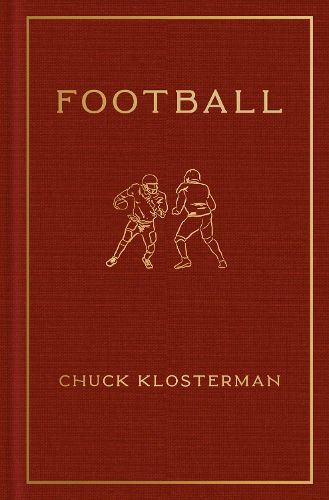Readings Newsletter
Become a Readings Member to make your shopping experience even easier.
Sign in or sign up for free!
You’re not far away from qualifying for FREE standard shipping within Australia
You’ve qualified for FREE standard shipping within Australia
The cart is loading…






Chuck Klosterman - New York Times bestselling critic, journalist, and, yes, football psychotic - did not write this book to deepen your appreciation of the game. He's not trying to help you become that person at the party, or to teach you how to make better bets, or to validate any preexisting views you might have about the sport (positive or negative). Football does, in fact, do all of those things. But not in the way such things have been done in the past, and never in a way any normal person would expect. Cultural theorists talk about hyperobjects - phenomena that bulk so large that their true dimensions are hidden in plain sight. In 2023, 93 of the 100 most-watched programs on U.S. television were NFL football games. This is not an anomaly. This is how society is best understood. Football is not merely the country's most popular sport; it is engrained in almost everything that explains what America is, even for those who barely pay attention. Klosterman gets to the bottom of all of it. He takes us to a metaphorical projection of Texas, where the religion of six-man football merges with America's Team [sic] and makes an inexplicable impact on a boy in North Dakota. He dissects the question of natural greatness, the paradox of gambling and war, and the timeless caricature of the uncompromising head coach. He interrogates the perfection of football's marriage with television and the morality of acceptable risk. He even conjures an extinction-level event. If Zizek liked the SEC more than he liked cinema, if Stephen Jay Gould cared about linebackers more than he cared about dinosaurs, if Steve Martin played quarterback instead of the banjo... it would still be nothing like this. A century ago, Yale's legendary coach Walter Camp wrote his unified theory of the game. He called it Football. Chuck Klosterman has given us a new Camp for the new age, rooted in a personal history he cannot escape.
$9.00 standard shipping within Australia
FREE standard shipping within Australia for orders over $100.00
Express & International shipping calculated at checkout
Stock availability can be subject to change without notice. We recommend calling the shop or contacting our online team to check availability of low stock items. Please see our Shopping Online page for more details.
Chuck Klosterman - New York Times bestselling critic, journalist, and, yes, football psychotic - did not write this book to deepen your appreciation of the game. He's not trying to help you become that person at the party, or to teach you how to make better bets, or to validate any preexisting views you might have about the sport (positive or negative). Football does, in fact, do all of those things. But not in the way such things have been done in the past, and never in a way any normal person would expect. Cultural theorists talk about hyperobjects - phenomena that bulk so large that their true dimensions are hidden in plain sight. In 2023, 93 of the 100 most-watched programs on U.S. television were NFL football games. This is not an anomaly. This is how society is best understood. Football is not merely the country's most popular sport; it is engrained in almost everything that explains what America is, even for those who barely pay attention. Klosterman gets to the bottom of all of it. He takes us to a metaphorical projection of Texas, where the religion of six-man football merges with America's Team [sic] and makes an inexplicable impact on a boy in North Dakota. He dissects the question of natural greatness, the paradox of gambling and war, and the timeless caricature of the uncompromising head coach. He interrogates the perfection of football's marriage with television and the morality of acceptable risk. He even conjures an extinction-level event. If Zizek liked the SEC more than he liked cinema, if Stephen Jay Gould cared about linebackers more than he cared about dinosaurs, if Steve Martin played quarterback instead of the banjo... it would still be nothing like this. A century ago, Yale's legendary coach Walter Camp wrote his unified theory of the game. He called it Football. Chuck Klosterman has given us a new Camp for the new age, rooted in a personal history he cannot escape.